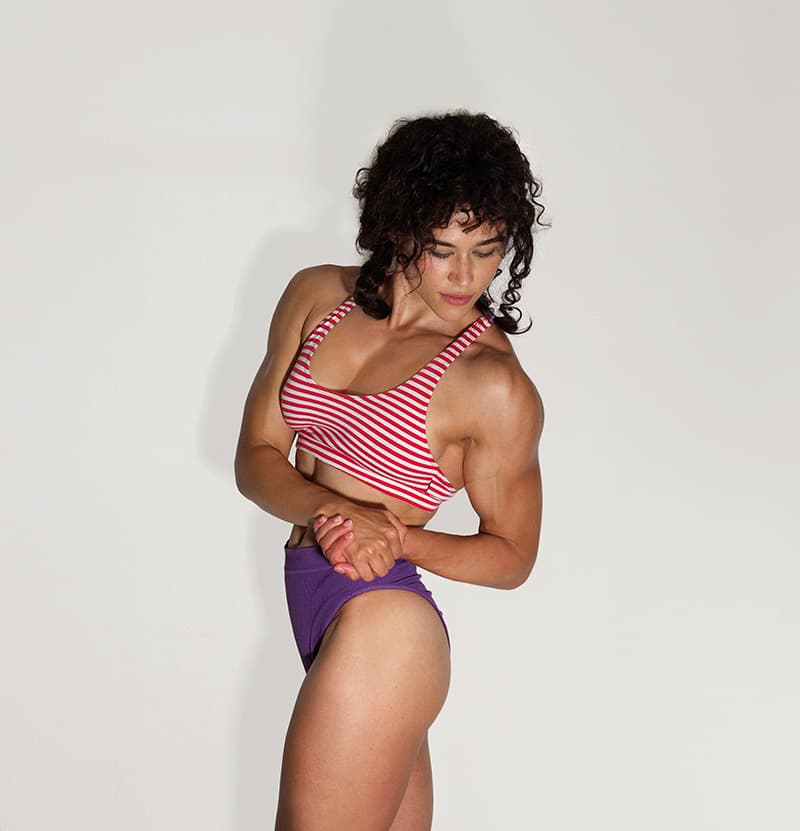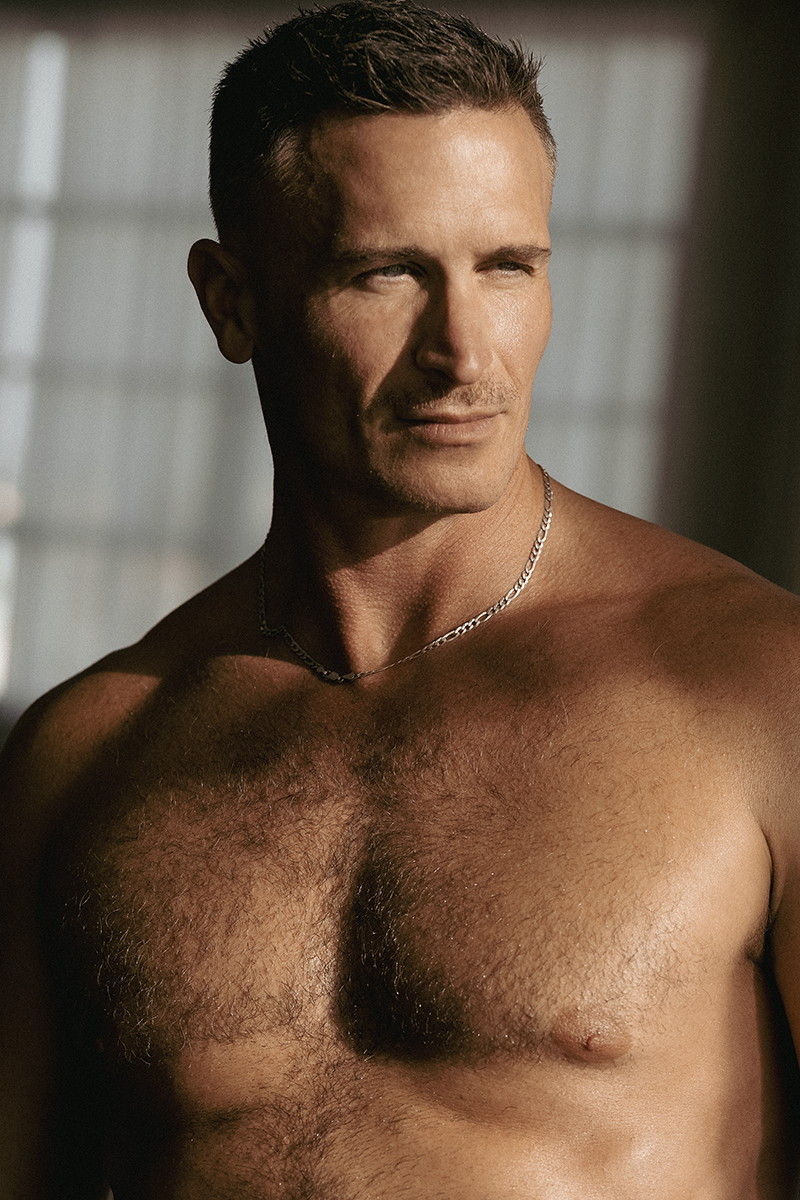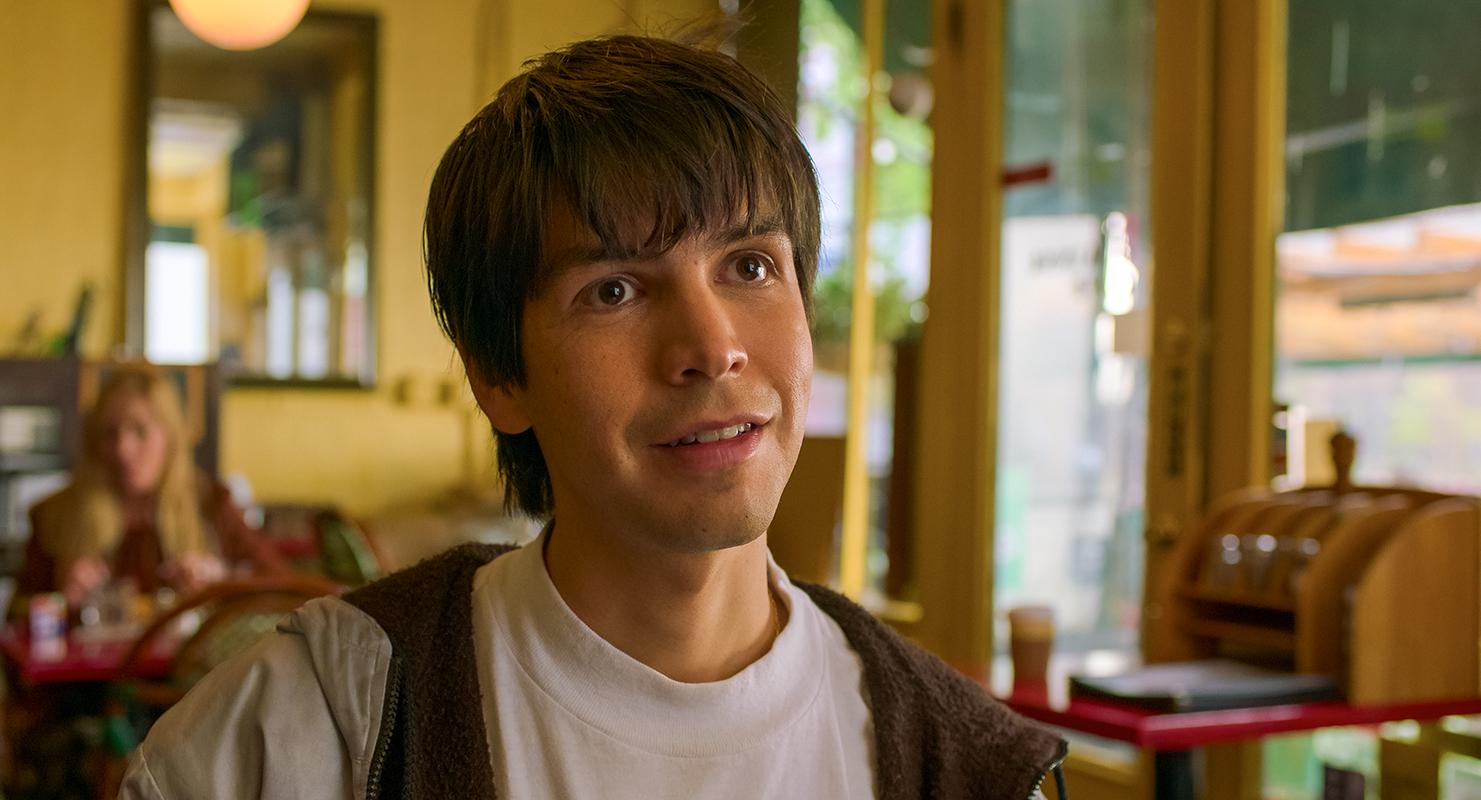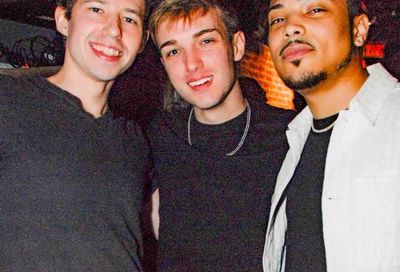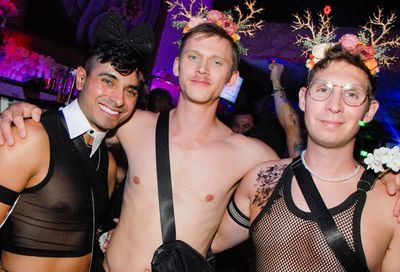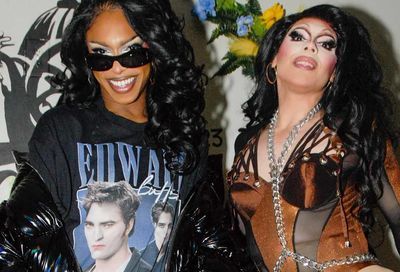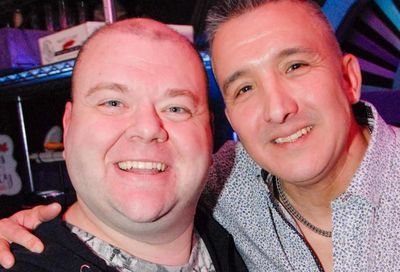Robin de Jesús: Leading Man
Beloved for his role in the movie Camp, Robin de Jesús steps into the spotlight in a new production of In The Heights

Robin de Jesús did not grow up in a musical family. Instead, he got his start participating in parrandas, a Puerto Rican form of caroling that builds to a critical mass of people as the troupe moves from house to house.
“You get the band together, you go to someone’s house, you knock on their door,” says the 33-year-old actor. “You give them a heads up that you’re coming, you sing for them, you improv, and they give you food and drinks.
“Then what happens is the people that live in that house join your group, and you go to the next person’s house and do the same thing. Then you take those people along,” he continues. “So as the night progresses, the group gets larger, and larger. When I was a kid, like seven years old, doing this, we would be out until five, six in the morning.”
Parrandas introduced de Jesús to singing, but it wasn’t until middle school that it — and musical theater, in particular — became a passion. He acted throughout high school, eventually landing the role of the flamboyant Michael Flores in Todd Graff’s 2003 independent film, Camp.
But after that initial success, de Jesús spent years waiting tables while trying to make it on Broadway. He finally received the chance to read for the part of Sonny in Manhattan Theater Club’s off Broadway production of In The Heights, a musical about Hispanic-Americans in Manhattan’s Washington Heights neighborhood.
After making his Broadway debut as an understudy to Wilson Jermaine Heredia’s Angel in Rent, de Jesús learned he had been cast in In The Heights. The experience would ultimately shape both his personal and professional life.
“Prior to In The Heights happening, I had put Robin, the person, on hold until he got to Broadway,” he says. “I was so obsessed with my career, and so obsessed with originating a show on Broadway, that I didn’t date.
“That show changed my life, on a spiritual level. I have ride-or-die friends that didn’t exist before that show,” he continues. “I lost my virginity during that show. I met my first love of my life in that show. There was a lot of firsts, and a lot of growth, and I wouldn’t be who I am today, without all of that experience.”
His portrayal of Sonny won him a Drama Desk Award for Outstanding Ensemble Performance in 2007 and a Tony nomination for Best Featured Actor in a Musical the following year. He subsequently starred as Jacob in the 2010 Broadway revival of La Cage aux Folles, earning yet another Drama Desk and Tony nomination. His most recent move, appearing in Olney Theatre Center and Round House Theatre’s co-production of In The Heights, this time as lead character Usnavi, brings him full-circle to the musical that shaped his career.
Asked about one day winning the Tony that has already eluded him twice, de Jesús is even-keeled in his response.
“My heart wants it, my mind doesn’t care,” he says. “It’s a very romantic thought about winning it, and having that moment, and being able to thank the people you love. But you can also do that in your regular, everyday life. So there’s a perspective, or there’s an awareness I have, that I don’t need that.”
He’s also become much more focused on developing the characters he portrays, refining his acting skills, and looking for opportunities to grow as a performer. Nowhere was this more evident than his decision to pass up a role in the blockbuster movie musical, Pitch Perfect. Still, de Jesús has no regrets, career-wise.
“It’s always played out that it shows itself, like life’s path reveals itself to me, that it turned out the way it should have,” he says. “There hasn’t really been a role that’s lingered. There’s always like an initial, ‘Oh, okay, that sucks,’ but moving on is more my approach.”
Above all, de Jesús remains extremely close to his extended family, whom he loves spending time with when he’s not in the middle of a show.
“I became really aware a few years ago that I will most likely not have children in my life,” he says. “Because of that, I feel very devout to my niece and nephews, so they’re a major part of my life. A lot of the time, when I take a gig, a big part of that decision is, ‘How long am I going to go without seeing them? Is the show appropriate for them to see?’ There’s a certain amount of responsibility I feel toward them, but it also keeps me in line. I want to be good role model for them.”

METRO WEEKLY: How did you first get involved in acting and musical theater?
ROBIN DE JESÚS: I always wanted to be a singer, but I had a really bad voice. Puberty changed that around, and suddenly, I knew how to match pitch, so I started singing in the choir in middle school. Someone introduced me to musical theater, and that led to me doing my first show, the summer before my freshman year of high school. Then it was like all hell broke loose, after that.
I knew of a musical theater program in our home town, it was a community theater mixed with the school. So where you go, and you pay, and they do a musical. Everyone will get a role, you do it for two weekends, and it was double cast, so you play one role one weekend, and the other weekend you were in the ensemble and someone else played the role. Between that and the high school shows, I was consistently doing two, three shows at one time, plus all the choir stuff. I sang in the church choir, and was exposed to that musical theater culture. That wasn’t the norm in my family.
MW: What led to your role in Camp?
DE JESÚS: When I was a senior in school, the goal was to be a classical singer. Which wasn’t really my goal, it was my teachers’ goal. Because they felt my type, vocally, was more suited for classical music and opera. But my heart wasn’t in it.
I randomly found out about an audition for this independent film called Camp. It was a movie about kids at a summer camp for musical theater. It was this super-duper, gay-friendly, indie movie, about love, discovering your sexuality, and being in the place where all who are considered freaks are normal, and can appreciate their quirkiness.
That movie completely changed the trajectory of my life. It gave me the courage to continue discovering my sexuality, because it was less defined then. It gave me the courage to discover that I was, in fact, an actor, and not just a singer. It led to a couple of years of me not really working, because I was figuring out how to audition, and how to network, and all the stuff you’ve got to do to be in this business. But then it leveled out, a few years later, when I made my Broadway debut.
MW: What was it about musical theater that appealed to you?
DE JESÚS: With musical theater, it’s such a blend of everything I love to do. The acting, singing, and dancing. But additionally, musical theater has such a joyous spirit and an energy to it. Even with the depressing musicals, there’s something about them that just makes you feel good, and less weighted. It’s very dream sequence-y, you know. You don’t sing in real life. You don’t just burst into song, or tell someone off through a song, but there’s something about it that is so uninhibited.
I feel like musical theater has zero fucks. We’re just going to fucking sing and you’re going to believe it. We’re gonna dance and you’re going to believe it, you’re going to buy into it. And it may feel foolish, but it’s really, really moving. It cuts through the bullshit and right to the heartstrings. There’s something about music that takes you on more of a journey than most dialogue, and opens your heart more to receive a message, or just to feel.
I love that magical-ness. It feels like you’re in the world of Moulin Rouge. I remember when I first saw that movie, I was like, “What is this world? I want to know about this.” I feel the musical theater world is like that.
MW: When did you realize that you were gay?
DE JESÚS: I always knew I liked boys. I just didn’t know if I didn’t like girls. Especially when you’re young, hormones are going. You’re like, “Oh, that girl got me hard. I guess I must like girls too,” but really, it’s just sex. It took me a while to really flesh out that I have this emotional connection with men that I don’t feel with women.
When I was in my junior year of school, I came out to my mom, my sister, my family, but not all of my friends. I only told the friends who would ask, or if the subject came up. At that point, I think, my approach to sexuality was apologetic, unlike now. So I never said it, out of fear of losing them. Whereas now, I think I would just say to myself, “Oh well, fuck it.”
After doing Camp and moving to New York, it all became less blurry, less nuanced, and I was able to see, “I’m into men, and that’s predominantly it.” Early on, I rebelled against that fact, especially because in Camp, my character was this fabulous, effeminate human being, so that became the go to character for me. It’s like, “Oh, we need a drag queen, call Robin,” which is cool — everyone wants to work as long as the role is good. But I wanted to diversify my skills.
That proved to be difficult, as an out, gay man. There are different casting directors for different projects in New York. So what I would do is, if I knew a certain casting director only called me in for gay roles, I wouldn’t audition for them. I would just turn it down. Then if there was someone who I knew saw me in all of my facets, for that person I’d audition, because they see me as many things. That meant I lost out on work. It took me realizing that straight guys play straight the majority of their career, and no one ever says, “Ugh, they only play straight roles.” Yet, if a gay man plays mostly gay roles, it’s like, “Oh, they only play gay.” It’s very interesting and I became fascinated by that realization.
What I find now is, I love doing gay work. I love doing work that tells our stories. It’s not that I can’t do the other stuff, it’s just that I want us to have more roles, and more stories, and to realize that we are normal, and for society to normalize us as a community.
MW: Are there enough roles for LGBTQ actors, or do you find yourself competing for a limited number of gay roles?
DE JESÚS: Listen, it’s not as bad as, say, Asian people looking for roles for their community, but it’s still not as represented as I think it should be. The bigger issue, when it comes to specifically gay roles in film and TV, is that straight men are getting them. I was talking to my buddy, Michael Urie, and we were like, “Oh, great, another gay role going to a straight guy.” It’s just interesting to me that straight men get more chances at diversifying their acting skills than gay ones.
MW: Why do you think that is?
DE JESÚS: When people are forming films and TV shows, a lot of it has to do with having names, and having people that make your project easier to sell. It’s like, “Oh, well, we don’t have that many gay men who sell out the box offices.” But how would we get that, if we’re never given the opportunity? The only gay men who get to become that are the ones who are closeted, and then come out, sometimes. Or the ones that no one knew were gay, if it’s like a Matt Bomer, or David Hyde Pierce, a Neil Patrick Harris. I don’t know all the facts, but I can’t help but think that part of the reason they were able to have the success they had, is because no one knew they were gay for a long time.
MW: Do you think that being gay has hurt you when you try out for roles that are typically written for Latino characters?
DE JESÚS: I know so. I remember a friend of mine was putting on a project, and a casting director, who’s cast me before, said, “Oh yeah, no, Robin’s way too effeminate for that.” So then my friend tried to explain, “Well, what about this straight role he played?” “Yeah, but even that was over the top.” Then he followed it up with, “Oh, he can only play drag queens and queens.” It’s funny because I went back to that casting director, with that knowledge, for a straight role and he gagged. He totally was not expecting that. It was the second time he’d auditioned me for a straight role, and I came in, and brought it. I didn’t get it, but I got a callback.
Thankfully, most other casting directors have been very open and receptive to seeing me as straight. In musical theater, there’s always go-tos for people when you’re casting. It’s not so much that they don’t see me as straight, it’s just that in their minds, which are compartmentalizing, when they see a gay role, they’ll go, “Oh wait, let’s call Robin,” because it’s an easy go-to, as opposed to thinking out of the box.
The unfortunate thing about that, besides sometimes not being able to pay my bills, or have the opportunity to get a job, is that those stories are missing nuances. It’s so much more interesting to see actors play roles that are outside of their norm, because there are things that you wouldn’t normally get.
I remember, one of the first gigs I ever booked in New York was as this horrible mass murderer. It was the role that got me my agent. It was the role that put me on map in theater, and we thought it was going to be my Broadway debut, [but] it never happened. I always felt like, how fascinating, that my career takes this turn to this new, dark, complex character. Then I booked Rent, on Broadway, and it was like that [role] never existed.
Then when In The Heights happened on Broadway, I was playing that type for everything, in all my auditions. Then it was La Cage aux Folles, and it went back to playing a drag queen. So it’s like it’s always whatever your present gig is in New York.
MW: How did your family react to your coming out process?
DE JESÚS: I have my mom, my dad, one sister, who’s older, and one brother, who’s older than me as well. There have been stages of acceptance. My mom was always very loving and always very close to me, but I know for a fact, there are certain opinions that she had that were not informed. She did think of it as a sinful life, and in conflict with her Catholic beliefs. But she loved me and wanted me to take care of myself, and live my truth. It also helped, for her, that when she remarried, she married a man who was very open-minded, so there was less shame attached to it.
I think one of the things that happens often with parents, when their kids come out, is all the shame issues become about them. There’s this whole selfish aspect to the parents’ acceptance of the kids’ sexuality that happens. I think my mom definitely figured stuff out, and when I have partners and I bring them home, she loves that. She’s very open-hearted and welcoming.
There still are moments with the family where they don’t fully get that you’re not less of a man because you’re gay. I’ve had relatives make jokes about “the other girl” in the family. It’s like no, no, no, don’t get me wrong, I’m a gay man, but I’m still a man. But overall, [the journey] from where we started to where we are now is amazing, and my niece and nephews are very open-minded.
One of my nephews, if I’m in the mall with him, he’ll look at a guy and go, “Do you want me to get his phone number for you?” My niece is ten, she does the same thing. So that’s really dope, and beautiful, to be able to see what it was like with my family, when I first came out, to now with the kids, and their level of openness, and the fact that they’re able to not judge and just see love.
MW: How have you found playing a different character in In The Heights than when you first did the play?
DE JESÚS: It’s so cool. It’s so stimulating, and exciting, and nostalgic. I find myself in rehearsals either crying in the corner or laughing, just thinking about something that we did in the show before. Or smiling because there’s a line I’d never heard, or I’m hearing it differently now. There’s this nuance, in the script, that I didn’t realize or appreciate. It’s kind of cool when you realize your friends are really talented and I think I’ve rediscovered how talented Quiara Alegría Hudes, the book writer, is, and Lin-Manuel Miranda [the original Usnavi].
In terms of me, personally, working on the role, it’s different because I’m playing the leading man now. And there are so few leading man roles that are so specifically right for me. So it’s a new responsibility, and I guess more. It also is different now, because of the political climate. We tell a story about immigrants, living in an immigrant neighborhood, striving to just work, and to get along, and to achieve more, and to live the American dream, which is what everyone wants. But right now, we’re hearing all these very loud voices say that we’re less than, or we don’t belong here, or we need to go back, or we’re not contributing, we’re not doing our part. The show says the complete opposite. What it shows is that we all have common denominators. You may not see it, but if you let me tell you my story, you will.

MW: What’s the difference between doing In The Heights in D.C. versus New York?
DE JESÚS: When it comes to commercial Broadway theater, what I get to play is very limited. And it takes me coming here, to be able to play the leading man. That doesn’t happen in New York. I will probably grow more here, in the D.C. area, than I will in New York playing the normal shtick that I get cast in.
It’s interesting, being in D.C. in this political climate. Because this is the hub for politics, and there is so much anti-immigration rhetoric going on. Maybe we’re preaching to the choir to some people — theater people tend to be a little more liberal. But maybe there will be a few in there who will receive the message, openly, for the first time. That is more important than not telling the story at all.
MW: What political message do you hope In The Heights will expose people to?
DE JESÚS: I’ll give you an example. It’s really funny to me. People have a hard time accepting things, even when they’re liberal, that are different from them. One of the donors here, at the theater, was telling me what a difficult time she’s had. She’s listening to the cast recordings in advance so that she doesn’t miss things. She wants to understand everything. I said to her, “You know, I promise you won’t miss anything major. You may miss a rhyme, or a joke, or something will be in Spanish, but there will always be context clues. You will always know what’s happening in the big picture.”
And then she was like, “Oh my god, I know, and the Spanish. I took Spanish for 50 years, and I still am like…” So I said to her, “You know, it’s like Yiddish.” You listen to Yiddish, and you may not know what it is, but the alliteration of it kind of informs the meaning. Or there are context clues in the words surrounding it. And it was funny to me, because she accepted that. She said, “Oh my god, I caught the Yiddish words in this, this, and this.” So she could see a show with Yiddish thrown in, which she did not know, and understand and accept it. But when it was Spanish, it almost became a bigger deal to her. I’m very fascinated by that.
I think, sometimes, there are certain languages that people have a harder time accepting, or they just feel like they have to know everything happening. This was not the case with this woman, but it is very interesting that there are people in this country who think Italian is beautiful, who think French is glorious, and think it’s so intellectual to speak these languages, but the moment they hear Spanish, their face frowns. There is definitely a different treatment by a large portion of people. Or there’s a disdain that a large portion of people have toward the Spanish language that they do not possess for others.
MW: Why do you think that is?
DE JESÚS: Because it’s like the low end of the totem pole, the race totem pole. You know, it’s always a hierarchy, and we’re on a lower rung.
MW: So they hear Spanish, and they think Third World Latin America, not Spain?
DE JESÚS: Third World Latin America, raping my kids, selling drugs, dropping out of school, living off of our government-funded programs. I recognize that I’m reading into that, but I think it’s there. It happens in black hip-hop culture as well. If you carry yourself with a certain kind of swag, people are condescending, you know? It’s like, you’re gonna treat me differently because of the way I look, but no one’s focusing on the quality of the human being, and their level of goodness.
MW: Is there some actor, or actress, that you’d love to work with, that you haven’t worked with yet?
DE JESÚS: I want to work with Laurie Metcalf again. She was Aunt Jackie on Roseanne. I worked with her in a play at Lincoln Center called Domesticated a few years ago, but I didn’t have a scene with her. I was only in one scene in the play. She is fucking visceral. She is a beast, uninhibited, no ego. She’s this weird, perfect combination of technique, as an actor, but also living in the moment, being present, and very, very raw. She is really the ideal. As far as actors go, I don’t even know if people really realize how amazing that woman is, outside of the theater world. I’d give anything just to be a fly on the wall. I would assist somebody, if I have to. But I’d like to be on the receiving end. I’d rather actually get to act with her.
MW: If you had a choice, would you stick with musical theater, or would you like to do more film projects?
DE JESÚS: I want to diversify. I would love to do more film and TV, but for me it’s ultimately the role. “Is this role meaty, is it layered, is it nuanced, is it different than what I normally do?” What you want from each role changes with time, because you’re checking things off the list as you book gigs, hopefully. But I don’t have a preference.
They’re both very, very different. They both require focus in different ways. I like being able to tell a story chronologically, like doing everything in one take on Broadway.
I don’t feel as much pressure knowing that I have the next day to go do the role again. Whereas in a film, there’s a lot that is out of your control. If I had to choose which one I prefer, it’s theater. The work, the roles that I’ve had to play, and the challenges I face in theater, are significantly more than in film and TV. I did this play last year, called Homos, or Everyone in America, off Broadway, and for years I had been asking for role like that.
I remember, when I got that role, I was like, this is what I’ve always wanted, this is the level of work that I want to do, and the intensity, and I want to get fucking dirty. It was hard. It’s the hardest show I’ve ever done in my life, but it was rewarding.
MW: Why was it so hard?
DE JESÚS: For many reasons. It was emotionally very draining. It was a story not told chronologically, so it would bounce back and forth between 33 scenes. The majority of the play was between me and one other actor. There were two other actors in the show, but they had scenes sprinkled throughout. It was very wordy. It was about these two men who fall in love, via socio political debates, against the backdrop of a hate crime, and dealing with the PTSD after the hate crime.
So, you’d do a scene where you’re having this super-duper angry argument, and you’d stop mid-sentence, and start a new scene where you’re talking about how much you’d love to move in with one another. Then you’d go back to the argument scene, a couple lines before you stop, and finish it. It was very stop-and-go, but it was thrilling.
I remember it was very daunting and required a lot of energy, and that was cool. That was what I asked for, that’s what I wanted, but I knew there was inevitably going to be a day where I was going to have the “First World problem” of feeling too tired to do my job. Like I said before, this show dealt with a major hate crime. So what I did with the show was I had a jar with the names of different hate crime victims. Every time I felt tired, or ungrateful, or just any emotion that was not conducive to the show, I would pull out a name from the jar and remind myself how personal the story can be, and how it matters to someone out there. And I would dedicate the show to that person. That would give me the energy, or just like tell my ego to shut the fuck up, and help me get through the show.
In The Heights runs through Sunday, Oct. 15 at the Olney Theatre Center’s Mainstage, 2001 Olney Sandy Spring Rd., Olney, Md. Call 301-924-3400 or visit olneytheatre.org.
Support Metro Weekly’s Journalism
These are challenging times for news organizations. And yet it’s crucial we stay active and provide vital resources and information to both our local readers and the world. So won’t you please take a moment and consider supporting Metro Weekly with a membership? For as little as $5 a month, you can help ensure Metro Weekly magazine and MetroWeekly.com remain free, viable resources as we provide the best, most diverse, culturally-resonant LGBTQ coverage in both the D.C. region and around the world. Memberships come with exclusive perks and discounts, your own personal digital delivery of each week’s magazine (and an archive), access to our Member's Lounge when it launches this fall, and exclusive members-only items like Metro Weekly Membership Mugs and Tote Bags! Check out all our membership levels here and please join us today!




